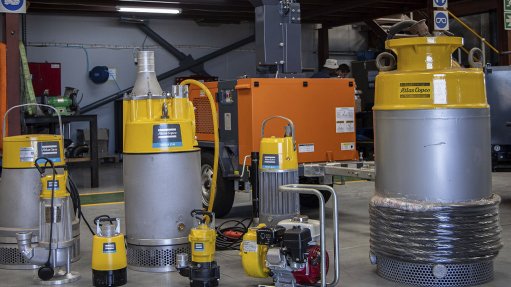
Submersible pumps have long been a staple in the world of fluid handling and pumping
Submersible pumps have long been a staple in the world of fluid handling and pumping, with their presence becoming more pronounced, especially in particular applications like sump pumping, wastewater management and numerous industrial processes. Ruaan Venter, Rental Development Manager at IPR, says that while engineers have various solutions at their fingertips submersible pumps often stand out especially when compared to vertical spindle pumps. So, what gives these submersible devices their edge?
“First and foremost, submersible pumps are known for their superior energy efficiency,” Venter says. “This elevated efficiency not only makes them outperform their vertical spindle counterparts, but it also leads to significant cost savings in the long run.”
Space is often at a premium in many dewatering setups, and this is where submersible pumps have the upper hand. Their direct placement in the fluid they handle means there is no need for extended piping or additional external infrastructure. This innate compactness becomes a boon, especially in locations where space is tight.
Maintenance is also a recurring concern in any wastewater, mining or industrial environment and Venter says that submersibles come out on top here as well. With fewer moving parts than vertical spindle pumps, which often come with above-ground mechanical setups, submersible pumps are less prone to wear. This reduced wear translates into more dependable performance, ensuring a smoother operational experience.
Fluid handling is the core of any pump, and submersible pumps excel in this domain. Venter explains that due to their fully submerged operation, these pumps are essentially immune to issues like cavitation or airlocks, which sometimes plague vertical spindle pumps. This submerged state ensures a consistent and smooth pumping process, offering significantly enhanced reliability.
“But it's not just about efficiency and reliability. Submersible pumps also promise a quieter operational experience. Their underwater functioning naturally dampens sound and curtails vibrations, offering a noise-free solution,” he continues.
Moreover, submersible pumps are stalwarts when it comes to reliability, even in challenging environments. Their underwater operation shields them from many external factors, ensuring they last longer and operate with unwavering reliability, even when conditions turn hostile.
But what if the fluid isn't clear water? Submersible pumps have got that covered too. They are adept at processing an array of fluids, even those riddled with abrasive solids. This versatility makes them an excellent choice for varied tasks, be it sewage or other wastewater pumping applications or dewatering in intricate mining operations or sumps in buildings or other structures.
Safety is paramount, and submersible pumps don't skimp on this aspect either. Their positioning underwater diminishes risks linked with rotating parts and potential leaks, issues that are often more glaring with above-ground pumps.
In today's age, where environmental consciousness is key, submersible pumps rise to the occasion. Many can be customised to avert fluid leaks, ensuring they operate with minimal environmental impact, adhering to contemporary ecological regulations and sustainability goals.
Lastly, their design boasts flexibility. Depending on the depth requirements, these pumps can be adapted, ensuring a fluid handling system that aligns perfectly with specific operational demands.
"The decision between submersible pumps and vertical spindle pumps really comes down to the unique demands of the application in question, but given the vast array of benefits submersibles bring to the table – from energy efficiency to environmental safety – they undeniably present a compelling argument for their widespread adoption across various sectors,” Venter concludes.
IPR is the master distributor for the full range of Atlas Copco submersible dewatering pumps, as well the Toyo range of heavy-duty slurry pumps. The company has an extensive reference base and offers its pumps for outright purchase or on a rental basis. Its skilled team can assess an individual application and propose the most appropriate solution that will ensure the lowest total operating cost for a customer.